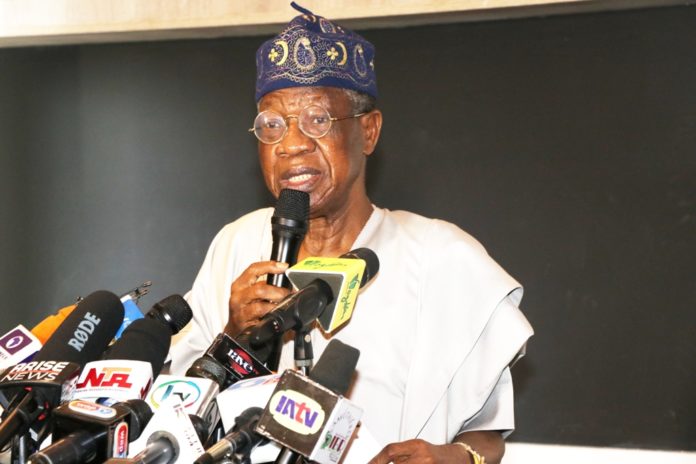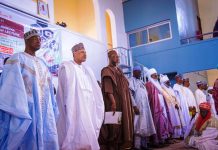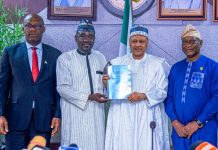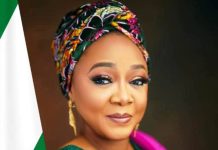Speech By The Hon Minister Of Information And Culture, Alhaji Lai Mohammed, During The Ministerial Task Force’s Engagement With Stakeholders In Lagos On Monday. 12th April 2021
PROTOCOL
Good morning ladies and gentlemen. I am glad to be here for this engagement between the Ministerial Task Force on the Digital Switch Over (DSO) and Stakeholders. As you are aware, I set up this 14-member Task Force, which I am personally chairing, on Feb. 23rd 2021 to quicken the pace of the DSO rollout across the country.
2. The Federal Ministry of Information and Culture considers the DSO as one of its priority projects, because of its potential to create jobs, bring governance closer to the people through better access to information, thus deepening democracy, bring internet to millions of homes and also provide quality programming, especially those produced locally, to Nigeria’s estimated 24 million television households, with high fidelity pictures and sound.
3. To date, we have rolled out the DSO in five states and Abuja. The programme was launched in Jos, Plateau State, on April 30th 2016.
Since then, we have gone live in the Federal Capital Territory, Kwara State, Kaduna State, Enugu State and Osun State. With the recent approval by the Federal Executive Council of outstanding payments to key stakeholders in the DSO Project, we are moving rapidly to cover the remaining 31 states. We are kick-starting the new rollout here in Lagos state on April 29th 2021, Kano state on June 3rd 2021 and Rivers state on July 8th 2021. We will then follow up with Yobe state on July 15th 2021 and Gombe state on August 12th 2021.
4. Without mincing words, let me say straightaway that for us, the DSO is about stimulating local content and empowering platform owners. It’s about creating jobs for our teeming population, especially the very creative youth population. As I have said at many fora, this project is capable of generating 1 million jobs in three years.
5. The manufacturing of Set Top Boxes or decoders alone is capable of creating between 40 and 50 thousand jobs. TV Production can create 200,000 jobs. Film Production can generate 350 to 400,000 jobs.
Distribution, which entails supplying the market with Set Top Boxes, TVs and Dongles for the internet, will require at least 100,000 wholesalers, retailers, electricians, installers, marketers and payment solution providers in order to cover the entire country, while TV and Online Advertising can create a further 50,000 jobs: These are just some of the job opportunities from a successful DSO Project.
6. Ladies and gentlemen, ahead of the impending massive rollout, we have taken some steps to create the enabling environment for the DSO to succeed, for local content to thrive, for indigenous producers to be more engaged and for the local advertising market to grow. Some of these measures have generated a lot of controversy and triggered a pushback from some quarters, but we remain undaunted in implementing them for the benefit of our people.
7. As many of you will recollect, we have carried out an unprecedented reform of the broadcasting industry, because we know that there is a nexus between those reforms and the success of the DSO. The amendments were necessitated by the need to boost the local content in Nigeria, curb anti-competitive and monopolistic tendencies and boost advertising revenues. I will just mention some of the amendments.
8. We have amended the Code to curb monopoly and exclusivity of programme content in order to create room for the local industry to grow. For example, the pay tv sector of the Broadcast Industry had been controlled by foreign interests, while indigenous efforts to compete have been frustrated or weakened by the established control of the big monopolies. It will interest you to know that to date, the National Broadcasting Commission (NBC) has licensed over 30 Nigerian pay tv companies, but only 1 is currently struggling to break through.
This is not acceptable. The monopolies exclude many Nigerians from enjoying or having access to premium content, especially in the area of sports and movies. With the amendment to the Code, anyone owning any sports rights must make such available to other parties in Nigeria, who may be interested in acquiring these rights. This obviously extends the opportunity for TV sports content to indigenous players.
9. We have amended the Code to stimulate growth in the Advertising Industry, introducing regulations mandating Media Agencies and Advertisers to offset all outstanding invoices within 60 days related to advert placement and the barring of carriage of adverts of defaulters. This will significantly address the diversion of advert revenue to the wrong hands; address lack of accountability in the advertising industry, and ensure significant empowerment in terms of funding for content producers and channel owners in the Nigerian media industry.
10. Also, under the new amendment, for a programme to qualify as local content, it must be authored, directed and produced by a Nigerian. In addition, at least 75 per cent of the leading actors and major supporting cast must be Nigerians, a minimum of 75% of its program expenses and 75% of post-production expenses paid for services provided by Nigerians or Nigerian
companies. This initiative will considerably develop the skills, expertise and industry of the local content market.
This is a redefinition of the old regulation that 60 percent of all programmed aired during prime time must be local content
11. There is also the amendment regarding production of Advertising for local goods and services: In order to stimulate growth and investment in the advertising sector, the Code was further amended to the effect that all television and radio advertisements for airing on all broadcast platforms, pertaining to products and services manufactured, grown, processed, developed, created and originating from Nigeria, shall be wholly produced in Nigeria. This amendment has started yielding results. I am informed that a big multinational just
recently cancelled a production slated for South Africa and moved it to Nigeria. The result? Practitioners in Nigeria made 10 million Naira from the production, while model fees totalled 5 million Naira. This is just the beginning, as we are determined to diligently implement the reforms.
12. And finally, Audience Measurement: The Advertising Practitioners Council of Nigeria (APCON) has published a Request For Proposal (RFP) from audience measurement and insight providers who wish to deliver audience measurement services on Nigerian media platforms. The benefits of audience media research for the media houses are that they have better control of their scheduling and inventory, in order to increase their audience engagement and level of advertising. It becomes clear what programmes attract specific audiences and therefore they can buy content and plan their programming schedules accordingly, in order to attract audiences that are valuable to the advertisers and brands.
13. Ladies and gentlemen, these are some of the things we have done to ensure the success of the DSO, stimulate local production of quality content, empower channel owners, further give a boost to the music and film industry and generate jobs. It is important for you to own these reforms and monitor their strict implementation, so you can reap the maximum benefits from them. Those who are benefitting from the old order that is skewed against indigenous producers and channel owners will do everything possible to sabotage the reforms, but they can only succeed if you let them.
14. On our part, I am directing the NBC to set up the special units that will report to the Honourable Minister on the implementation of these groundbreaking reforms. Also, as part of efforts to make the DSO proposition viable, I have directed GoTV and StarTimes to stop self carriage by the end of June 2021
15. On this note, I want to thank you most sincerely for your kind attention.






